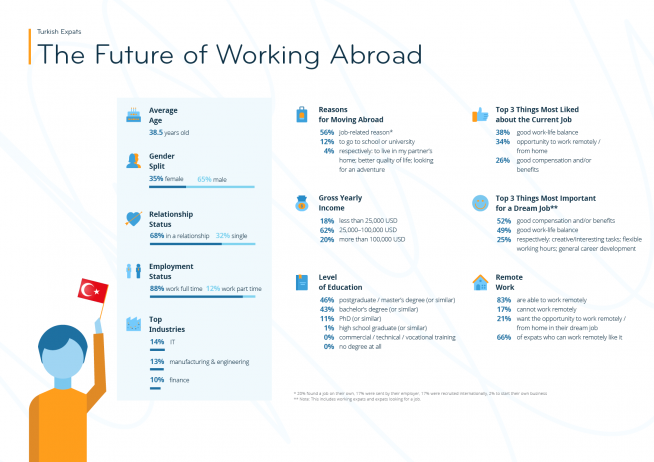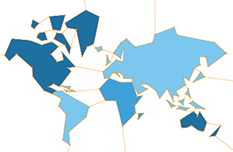A Good Compensation and Benefits Are Most Important to Turkish Expats
Why do Turks move abroad? According to the Expat Insider 2021 survey by InterNations, 56% of Turkish expats working abroad name their career as the most important reason for relocating to another country. Globally, just 47% of working expats moved abroad for job-related reasons. Most of the Turkish respondents found a job on their own (20%), followed by 17% each who were either sent by their employer or recruited internationally. Just 2% moved abroad to start their own business. Aside from work-related reasons, an above-average share of Turks working abroad (12%) originally relocated to go to school or university in their current country of residence (vs. 8% globally).
Turkish Expats Are Young and New to Working Abroad
On average, Turkish expats working abroad are 38.5 years old, which is a lot younger than the global average (43.1 years). While globally, the gender ratio among working expats is quite evenly split (53% male and 46% female), Turkish men (65%) tend to work abroad more often than women from Turkey (35%). What is more, close to seven in ten expats from Turkey (68%) are in a committed relationship, which is seven percentage points more than the global average (61%).
Maybe related to their relatively young age, many Turkish survey participants were new to expat life: more than two in five (41%) have only lived abroad for two to three years (vs. 26% globally), and 15% relocated just six to twelve months ago (vs. 10% globally). On the other hand, close to a quarter of expats worldwide (24%) have lived abroad for more than ten years, which is the case for just 9% of Turkish expats.
Excellent Qualifications and Positions
Nearly all Turkish expats working abroad (99%) graduated from college or university, compared to 88% worldwide: 43% have a bachelor’s degree (vs. 33% globally), 46% have a postgraduate / master’s degree (vs. 47% globally), and 11% even hold a PhD (vs. 8% globally).
The high level of education is also reflected in their current employment situation: An above-average share of Turkish expats work in senior or specialist positions (36% vs. 30% globally) or are top managers / executives (15% vs. 13% globally). On the other hand, 25% also work in lower/middle management (vs. 17% globally). Self-employment / freelancing is not very popular among Turks working abroad, with just 4% describing their current employment situation in these terms (vs. 11% globally).
Close to nine in ten Turkish expats (88%) work full time, which is also a higher share than the global average (82%). When it comes to the most common fields of work, IT (14%), manufacturing & engineering (13%), and finance (10%) are most frequently mentioned. While Turkish expats are actually overrepresented in the field of manufacturing & engineering (13% vs. 7% globally), only 4% work in education (incl. language education). Globally, this is the most common field among working expats (12%).
Turks Work in Destinations with Excellent Work Environments
More than seven in ten Turkish expats (72%) are satisfied with their job in general, which is about the same as the global average (73%). However, a closer look at individual factors shows that Turkish expats rate all of them a lot better than expats worldwide: the difference is the biggest in terms of satisfaction with their work-life-balance (75% happy vs. 68% globally), job security (73% happy vs. 67% globally), and working hours (75% happy vs. 70% globally). More than half (52%) are also satisfied with their local career opportunities (vs. 49% globally), and 68% rate the state of the local economy in their current country of residence positively (vs. 65% globally).
In fact, the top 3 most common destinations for Turkish expats working abroad (Germany, the Netherlands, the USA) all perform well in the Working Abroad Index of the Expat Insider 2021 survey. Germany ranks 6th out of 59 countries, followed by the Netherlands (13th), and the USA (26th). Expats in these countries are particularly happy with their local career opportunities (USA, Germany), their job security (Germany), and the state of the local economy (the Netherlands, Germany).
On the other hand, expats living in Turkey rate the country the worst worldwide to work in (59th out of 59). For example, 42% of working expats in Turkey are unhappy with the local career opportunities (vs. 29% globally), and 47% rate the state of the local economy negatively (vs. 17% globally).
Turkish Expats Enjoy Their Work-Life Balance …
When asked what they like most about their current job, a good work-life balance (38%) is the top response among Turkish expats. “The pace of life is peaceful and the balance between work and family life is good,” says a Turkish expat working in Amsterdam, the Netherlands.
The second most frequently mentioned aspect is the opportunity to work remotely / from home (34%). More than four in five (83%) are able to work remotely, and 66% of those who can do so like remote work. More than two in five (43%) even work fully remotely, compared to 39% of expats globally. The COVID-19 pandemic has had an impact on the remote work policies for about half the Turkish expats: 28% are now able to work remotely more often than before, and 21% say that remote work was newly introduced and is here to stay.
… and Wish for a Good Compensation in Their Ideal Work Environment
While a good compensation and/or good benefits is only the third most frequently mentioned aspect that Turkish expats like about their current job, it is on top of their list when it comes to imagining their dream job. More than half (52%) say that this aspect would be especially important to them in an ideal work environment. In fact, this is also the most important factor among expats worldwide (54% mention this).
At the moment, Turkish expats are mainly represented in the medium-income bracket: 44% have a gross yearly income ranging from 50,000 to 100,000 USD, compared to 33% globally. A below-average share each makes either less than 50,000 USD (36% vs. 44% globally) or more than 100,000 USD (20% vs. 23% globally).
Other than that, Turkish expats frequently mention a good work-life balance as an important aspect of their dream job. This factor is followed by creative/interesting tasks, flexible working hours, and general career development (25% each).
The Concept of New Work Might Be New to Many Turkish Expats
More than three in five Turkish expats working abroad (61%) say that factors like autonomy, freedom, creativity, personal development, and self-fulfillment are more important in the business culture of their host country than in Turkey. These values are closely related to the concept of New Work, which describes the new way of working in the global and digital age. On a global scale, just 49% of expats say the same about the comparison with their host country.
In fact, Turkey ranks among the bottom 5 destinations in the world (52nd out of 55) when expats compare the importance of New Work in the local business culture. More than one-third of expats working in Turkey (34%) say that New Work is not important in the local business culture (vs. 18% globally) — 13% even say that it is not important at all, compared to 5% globally.
“New Work might be a concept that is new to many Turkish expats as it does not seem to play an important role in their home country,” says Malte Zeeck, InterNations Founder and Co-CEO. “Maybe this is why their opinion about the importance of New Work in their host countries differs so much from the global average.”
In fact, just about half the Turkish expats (51%) find that New Work plays an important role in the business culture of the country they currently live in. Globally, 58% say this about their current country of residence. This is interesting as two out of the most common destinations Turkish expats live in rank among the top 10 destinations in the world where expats see a high importance of the concept of New Work. The USA tops this list (1st), followed by the Netherlands (5th), while Germany ranks mid-field (35th). For example, 74% of expats living in the USA find that New Work plays an important role there.




